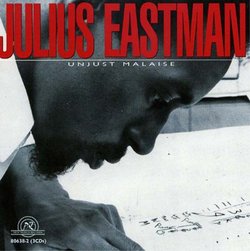Product DescriptionThis three-disc set marks the first appearance on disc of the music of the African-American composer Julius Eastman (1940?1990), who died fourteen years ago under unexplained circumstances and whose musical legacy was thought lost. This comprehensive and definitive document, which comprises almost all of Eastman?s signature works, will undoubtedly be a revelation for those who have thus far been unable to hear his work. In his book American Music in the Twentieth Century, composer/author Kyle Gann briefly sums up Eastman?s work and its importance: ?Born in New York, he graduated from the Curtis Institute in composition and was discovered by Lukas Foss, who conducted his music, including Stay On It (1973), one of the first works to introduce pop tonal progressions and free improvisation in an art context? Applying minimalism?s additive process to the building of sections, he developed a composing technique he called ?organic music,? a cumulatively overlapping process in which each section of a work contains, simultaneously, all the sections which preceded it. The pieces he wrote in this style often had intentionally provocative titles intended to reinterpret the minorities Eastman belonged to in a positive light: for example, Evil Nigger, Crazy Nigger, and Gay Guerrilla (all circa 1980). These three pieces, all scored for multiple pianos, build up immense emotive power through the incessant repetition of rhythmic figures.? Eastman was an energizing underground figure, one whose forms are clear, whose methods were powerful and persuasive, and whose thinking was supremely musical. His works show different routes minimalism might have taken, and perhaps some of those will now be followed up. This set of discs is a bold beginning to restoring to history the works of one of the most important members of the first post-minimalist generation.


 Track Listings (8) - Disc #1
Track Listings (8) - Disc #1